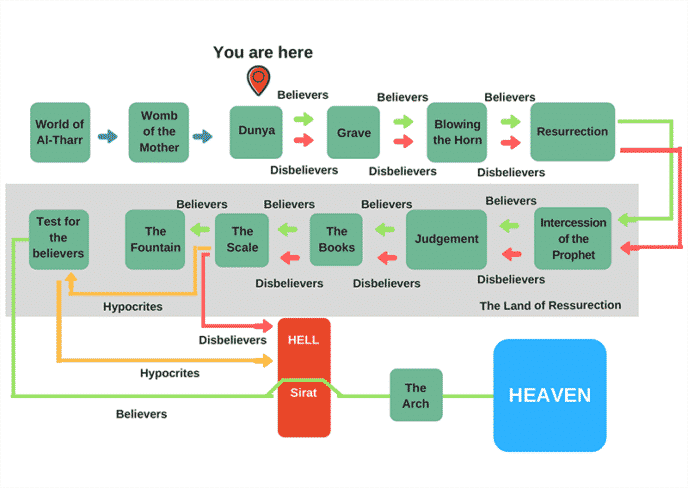Planning is a major part of our conscious or subconscious preparation for any trip. It doesn’t matter whether this trip is our daily commute to work or school (in this case most likely we will be on “auto pilot” mode and won’t think much about the map), or it may be a road trip to visit our grandparents’ house in another city or state. Even though planning is something highly disliked, and we naturally prefer to allow randomness to take us wherever the flow dictates, there is some element of curiosity in us that invites us to check the major milestones in any journey we take. But are we planning for the journey we are already on? The journey to the afterlife, the Hereafter?
For Muslims, we understand that the worldly life (dunya, i.e. lowly, inferior present life) is nothing but a short stop, a resting area for our souls to “fill up” some fuel in their long journey towards our destination – the Hereafter.
One day, the Messenger of Allah
woke up after sleeping on a straw mat with a lot of red marks left on his body. A companion, Abdullah Ibn Mas’ud
, was touched by the simple and humble life that Prophet Muhammad
led, and immediately said, “O Messenger
of Allah
! We could’ve easily prepared a soft bed for you.” He
replied, “Why would I pay attention to the glitter of this world? I am none but a traveler who found a tree and took a small rest under its shade, then went away and left it.” [Jami` at-Tirmidhi]
So we all agree that we are on a journey, but do we know exactly the details of the different stations and stops of this trip? I am definite that you know some of them, but having a complete picture of the itinerary to the afterlife from the Islamic perspective will help you plan well for this trip, give you the motivation to become more productive, and build your understanding of Akhirah-Oriented Productivity.

(This map is extracted and translated from a small booklet prepared by Dr. Jassem Al Mutawwa. Please note that the exact order of these blocks is not definite, but it is done with the best of the author’s analysis and compilation of different authentic narrations. In addition, I don’t plan to discuss each of those segments in detail; if you would like insight into each of the stages, join me at Productive Muslim academy’s upcoming course “Productivity with an Akhirah Mindset: Beginning with the Very End in Mind”.)
You = Your Soul
I want you to consider the “you are here” icon on the map before we jump into the individual stops of the journey, and answer a fundamental question: “Who am I? Really, who am I?!” Not your name, your degrees, your profession, your family name, your citizenship or nationality – think further than this.
According to Islamic principles, you are a soul, a nafs, or a ruh. Without getting into any philosophical arguments, Islam tells us that you are a soul that is “renting” a body for a temporary usage in the dunya stage. Your soul will stay till the end of time, but you will return your body once your contract in this world expires. This paradigm is at the core of Akhirah-Mindset-Productivity and will really help us understand and direct the usage of our energy, our focus, and our time.
The world of particles (Al-Tharr)
Unfortunately, this step is absent from the common Muslim approach to the afterlife, and many consider the first step in this journey to be the dunya or the grave. In my humble opinion, including this step is a major ingredient in our understanding of akhirah and productivity as it
- enforces the notion of the soul being our true reality, even when no “body” was attached.
- shapes our perception of time, and tells us that the journey has already started; it is not something happening at an unknown time in the future.
But what is the world of Al-Tharr really? It is the stage when all the souls were gathered in front of Allah  , and the fitrah (pre-disposition and inclination towards the faith) was “installed” into each human soul; it is when the operating system of imaan was “booted” into the very being of our existence. Allah
, and the fitrah (pre-disposition and inclination towards the faith) was “installed” into each human soul; it is when the operating system of imaan was “booted” into the very being of our existence. Allah  refers to this stage in the Qur’an:
refers to this stage in the Qur’an:
And [mention] when your Lord took from the children of Adam – from their loins – their descendants and made them testify of themselves, [saying to them], “Am I not your Lord?” They said, “Yes, we have testified.” [This] – lest you should say on the day of Resurrection, “Indeed, we were of this unaware.” [Qur’an: Chapter 7, Verse 172]
In addition, our spiritual focus, our default “factory setting” in life is well defined in the world of Al-Tharr: it is that of faith, love, and devotion to God. We should not belittle ourselves, have an excessive amount of guilt, and assume that we are evil beings who will never change and will never improve. We are not born into “original sin” as some religions preach, and we are not filthy and driven by desires as other philosophies teach. At the core of “us” is a beautiful, honored, and pure soul that recognizes God as the ultimate authority, but may get affected by the friends, family, and the environment.
The world of the womb
So our parents meet, and the intimacy between them results in a sperm that is injected into the womb of our mothers. In many places of the Qur’an, Allah  reminds people of their humble beginnings:
reminds people of their humble beginnings:
“Did We not create you from a liquid disdained (semen, etc.)? And We placed it in a firm lodging” [Qur’an: Chapter 77, Verse 20-21]
Later on, particularly after 120 days of conception, the marriage between the body and the soul occurs, and a more developed version of “us” is being prepared for the dunya stage, the Messenger of Allah  said,
said,
“The creation of each one of you is brought together in his mother’s womb for forty days in the form of a drop. Then he becomes a clot of blood for a like period. Then a morsel of flesh for a like period. Afterwards an angel is sent to him, who blows the breath of life and writes down four realities of his upcoming life: his means of livelihood (rizq), his life span, his actions and deeds, and whether he will end up in eternal happiness in paradise or everlasting misery in hell fire.” [Sunan Ibn Majah]
How does this affect productivity?
- A key element for social productivity is to be humble in front of Allah
 and towards other human beings. Our simple beginnings from a sperm should keep us in our place and destroy our ego and pride.
and towards other human beings. Our simple beginnings from a sperm should keep us in our place and destroy our ego and pride. - Our rizq (sustenance), in addition to the major life-changing events in our lives, are already written. We should place our trust in Allah
 (tawakkul), focus the effort on what’s within our control, and avoid wasting spiritual energy by being concerned about things that are pre-ordained for us. Allah
(tawakkul), focus the effort on what’s within our control, and avoid wasting spiritual energy by being concerned about things that are pre-ordained for us. Allah  specifically teaches us in the Qur’an that this axiom of faith aims at clearing our minds from negative feelings:
specifically teaches us in the Qur’an that this axiom of faith aims at clearing our minds from negative feelings:
“In order that you not despair over what has eluded you and not exult [in pride] over what He has given you. And Allah does not like everyone self-deluded and boastful,” [Quran: Chapter 57, Verse 23]
- Our “birthday” is basically a transition between the stage of the womb to the dunya. In contrast, when we die we are basically transitioning to the afterlife. The analogy between these two moments is a strong reminder for believers to direct their time, focus and energy so that they leave this world while earning the pleasure of Allah
 . Zain Al-Abedeen the famous scholar and poet once said:
. Zain Al-Abedeen the famous scholar and poet once said:
Son of Adam, on the day you were born, you were crying,
But those around you were full of joy and happiness.
So work hard for a day, when people around you are in weeping,
That you will be the one excited with cheerfulness.
Look out for the next installment to discuss more stages to the afterlife, and how we can link them to productivity.
What are the ways you are planning for the Hereafter? Share your thoughts in the comments section below!


 , was touched by the simple and humble life that Prophet Muhammad
, was touched by the simple and humble life that Prophet Muhammad 

